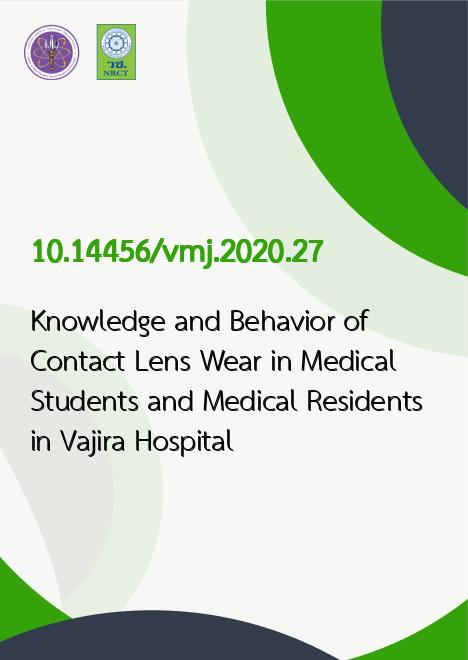
|
Knowledge and Behavior of Contact Lens Wear in Medical Students and Medical Residents in Vajira Hospital |
|---|---|
| รหัสดีโอไอ | |
| Creator | 1. Chantaka Supiyaphun 2. Puncharut Preechaharn |
| Title | Knowledge and Behavior of Contact Lens Wear in Medical Students and Medical Residents in Vajira Hospital |
| Publisher | Text and Journal Publication |
| Publication Year | 2563 |
| Journal Title | Vajira Medical Journal |
| Journal Vol. | 64 |
| Journal No. | 4 |
| Page no. | 275-286 |
| Keyword | contact lens, medical student, resident, behavior, knowledge |
| URL Website | https://tci-thaijo.org/index.php/VMED |
| Website title | Vajira Medical Journal (วชิรเวชสาร) |
| ISSN | 0125-1252 |
| Abstract | Objective: To determine knowledge and behavior of contact lens wear in medical students and medical residents in Vajira hospital. Methods: A cross-sectional study using questionnaire was conducted among medical students and medical residents who wore contact lenses within the recent one year in Vajira hospital. Results: A total of 660 (480 of medical students and 180 of residents) were recruited in this study. Twenty-four percent in medical student group and 17% in resident group wore contact lens in recent one year. The majority was female in both groups (79.3% and 80.6%, respectively). The average age was 21.4 years in medical student group and 27.8 years in resident group. The main reason for wearing contact lens is visual correction (67.3%). Approximately sixty percent in both groups wore monthly soft contact lens following by daily disposable lens (43.5%). Six improper contact lens compliance and care practices were reported as sleeping with their lens (22.6%), swimming with lens (26.5%), topping off lens storage solution (20.0%), not cleaning lens case daily (57.7%), prolonged wear over replacing schedule (18.4%) and no rubbing and rinsing (33.7%). Seventy-three percent in medical student group and 48.4% in residency group were classified as good behavior. The prevalence of good contact lens behavior in medical students were significantly higher than that of medical resident (p=0.013). However, the majority of participants in both groups were categorized in good knowledge (p=0.297). In all participants, we found statistical significant different between behavior and knowledge (p=0.001) Conclusion: The majority of participants in both groups have good knowledge. However, medical student group has better behavior in contact lens wear and care compare with medical resident group. |